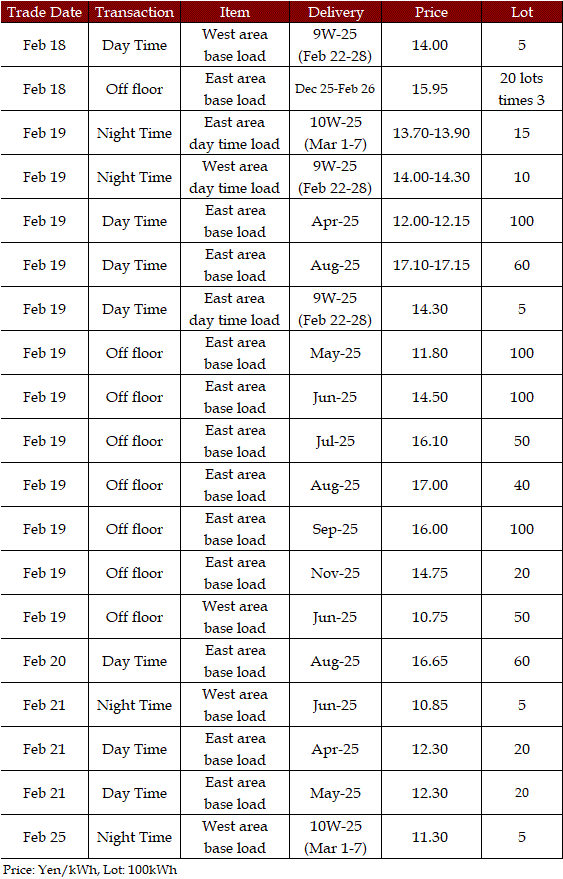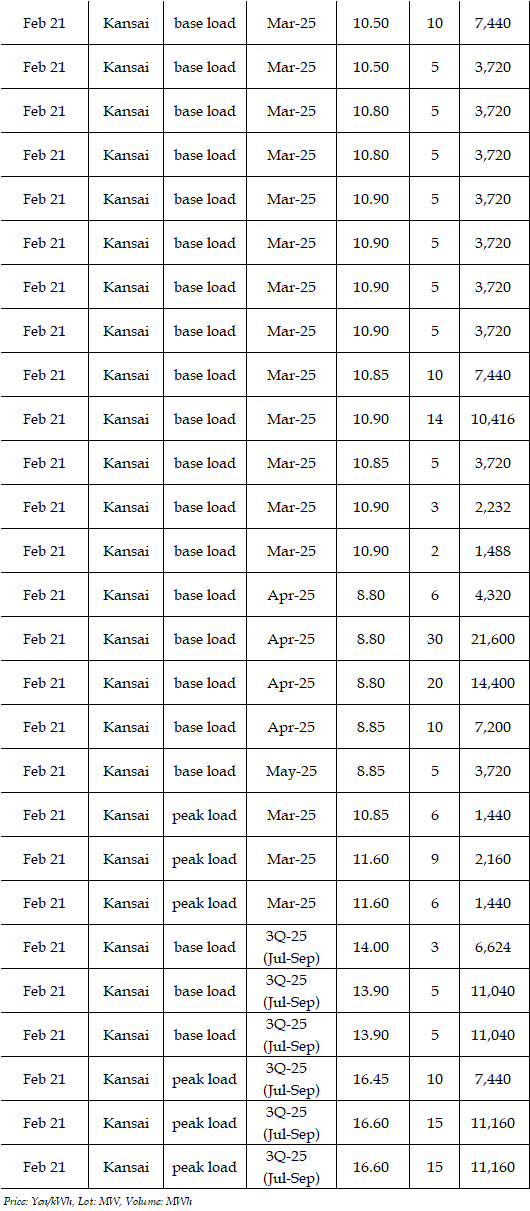|
In the day-ahead market on JEPX (Japan Electric Power Exchange), the 24-hour spot power prices on a weekly average basis for Feb 17-21 delivery gained ground from the previous week in both East Japan (50Hz) and West Japan (60Hz). From Feb 18 onward, a cold wave delivered freezing climate across Japan, and a growth in heating demand jacked up spot prices. But the weather was mostly sunny except Hokuriku and the Japan Sea side in North Japan throughout the week. Ampe solar power supply put a lid on day time prices, pushing down Shikoku to Kyushu to Yen 0.01.
In Tokyo and Kansai, the key areas in East Japan and West Japan, the 24-hour average posted a difference in favor of the West by Yen 0.61 for Feb 17 delivery, Yen 0.36 for Feb 18 delivery, Yen 0.59 for Feb 19 delivery, Yen 0.24 for Feb 20 delivery, and Yen 0.53 for Feb 21 delivery.
The fuel market trends in the third week of February were detailed as follows.
DES Northeast Asia spot LNG prices stood in the mid $14 level per mmBtu for prompt April 2025 arrival as of Feb 20, dropping steeply by about $1.30 from the end of the previous week (Feb 14). A plunge in European natural gas prices dragged down the LNG market in Northeast Asia. The market was weighed by views that ceasefire talks between Russia and Ukraine would make progress and it would pave the way for an expansion of Russian natural gas supply. The benchmark Dutch TTF (Title Transfer Facility) natural gas prices hovered around 47 euros per ton, plummeting by more than 10 euros from the recent high. In Northeast Asia, meanwhile, appetite from Chinese and Japanese end-users remained at the low ebb, a factor that capped upside potential in LNG prices. The Ministry of Economy, Trade and Industry (METI) announced on Feb 19 that Japan's LNG inventories for power generation stood at 2.01 mil mt as of Feb 16, down 140,000mt from a week before. Heating demand picked up in the aftermath of the cold wave. The figure was down both from 2.18 mil mt that was the end-February level last year and also the average of past five years.
FOB Newcastle thermal coal prices in Australia stood in the mid $103 level per ton for February 2025 loading as of Feb 20. The level was down more than $1.50 from the end of the previous week, mirroring a softness in gas prices.
In the crude oil market, WTI crude for April 2025 stood in the high $72 level per barrel as of the morning on Feb 21 while Brent crude for April 2025 was trading in the high $76 level. Both WTI and Brent were up about $2 from the end of the previous week. Oil facilities in southern Russia suspended operation following attacks by Ukraine on Feb 17, raising worries over tightening supply-demand fundamentals. Crude futures were also bolstered by drawdowns in middle distillate and gasoline inventories shown in weekly oil statistics released by the US Energy Information Administration (EIA) on Feb 20.
The actual highest price during the week was at Yen 29.00 in five areas in West Japan from Chubu to Shikoku for Feb 19 delivery. Meanwhile, the actual lowest price during the week was at Yen 0.01 in Kyushu for Feb 17-20 delivery and Shikoku for Feb 20-21 delivery.
By area, the weekly average of the 24-hour spot prices was at Yen 16.68 in Hokkaido, up Yen 2.14 from the previous week, Yen 16.68 in Tohoku, up Yen 2.11, Yen 16.70 in Tokyo, up Yen 1.53, Yen 16.75 in Chubu, up Yen 1.45, Yen 16.23 in Hokuriku and Kansai, up Yen 1.40, Yen 16.06 in Chugoku, up Yen 1.25, Yen 10.27 in Shikoku, down Yen 0.37, and Yen 13.32 in Kyushu, up Yen 0.22.
In the JEPX auction, volumes of offers were 1,233.83 mil kWh on a weekly average basis, down 2.5% from the previous week. Meanwhile, bids on a weekly average basis grew by 3.5% to 1,142.15 mil kWh. The weekly average of trade volumes increased by 1.8% to 850.17 mil kWh.
Power demand in nine areas of Japan during Feb 17-21 was a combined 14,309.36 mil kWh, up 1.0% from 14,168.80 mil kWh during Feb 10-14. The figure was up 15.9% from the corresponding period a year earlier. Demand during Feb 19-23, 2024 after day of week adjustment was 12,347.77 mil kWh.
Deals reported on TOCOM (Tokyo Commodity Exchange) during Feb 17-21 were as below.

Deals reported on EEX (European Energy Exchange) during Feb 17-21 were as below.










In the final week of February, spot prices are expected to soften from the third week. The temperatures in the final week are forecast to rise sharply in contrast to looming chilly climate in the third week, and heating demand is believed to decrease remarkably. Thus, buying interest in the spot market is expected to wane, a factor that will likely put a lid on spot prices. A source at a power producer and supplier said, "The intraday high in spot prices will not touch Yen 20. I suspect the 24-hour average will hover around Yen 12-13 in East Japan and Yen 10-11 in West Japan mostly during the week."
|
JEPX: System Price (Day Ahead 24 hours)
|
|
Weekday Price
|
17-Feb
|
18-Feb
|
19-Feb
|
20-Feb
|
21-Feb
|
|
24-Hour Ave
|
13.44
|
15.76
|
16.54
|
16.08
|
15.77
|
|
Volume (MWh)
|
828,741
|
860,877
|
866,374
|
849,454
|
845,403
|
|
(unit: yen per kWh) (date: delivery day)
|
|
|

|